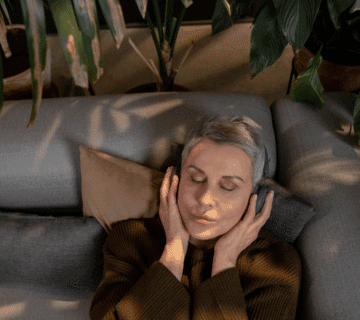September 2, 2025
It’s well known that Parkinson’s disease can increase anxiety and impair relaxation. Fortunately, there are ways to help mitigate it. Music is one of the most enjoyable tools for decreasing stress and promoting relaxation because it engages brain networks tied to emotion and reward. This means that listening to music can boost dopamine, the neurotransmitter depleted by Parkinson’s. Listening to music also supports mental health by stimulating social connection and emotional comfort.
Is all music created equal or are some varieties better than others at relaxing the brain? Let’s find out!
Instrumental Music
One of the best choices for calming the brain is instrumental music. Unlike songs with lyrics, instrumental tracks allow the mind to ease without the need to process language or concrete meaning. This is particularly helpful for people with Parkinson’s, who may already be managing cognitive fatigue. Research from neurologic music therapy programs supports the use of slow instrumental music to reduce anxiety, improve mood, and even enhance sleep quality in people with neurological conditions.
Music with a tempo of around 50 to 60 beats per minute is ideal for reducing heart rate, easing muscle tension, and matching the body’s natural rest rhythms. Classical genres, soft piano, ambient guitar, and even instrumental jazz or lo-fi can all fall into this category. What matters most is that the music feels gentle, predictable, and soothing to the listener.
Natural Sounds
Since natural soundscapes have a calming effect on the brain by themselves, combining ambient or meditative music with elements like rainfall, ocean waves, or birdsong can create the sense of being in a restorative environment and deepen one’s sense of peace. For some, listening to recordings of rainstorms or forest walks can create a mental “reset,” reducing sensory overload and easing stress.
Apps and streaming platforms offer a wide range of listening options, and they’re often used in guided relaxation or meditation routines. To kick things up a notch, try searching your favorite streaming platform for binaural beats, subtle sound frequencies that influence brainwaves, which may enhance these effects even more. Some studies suggest binaural beats can increase theta waves associated with calm and relaxation, though more rigorous trials are still ongoing.
Personal Meaning
It’s time to crank up those old favorites, because research has shown that nostalgia can be a powerful trigger for happiness, relaxation, and even cognitive resilience. Whether it’s a wedding song, a tune from your teenage years, or a lullaby your parents used to sing, familiar music does more than spark warm feelings. It can strengthen emotional connections and help you recall joyful memories because listening to music activates the limbic system, the part of the brain responsible for memory and emotional processing. This helps release dopamine, lift your mood, and ease anxiety.
Studies have also shown that personally meaningful music can help preserve a sense of identity, especially for individuals navigating memory changes or cognitive decline. Creating a “memory playlist” that consists of songs tied to important life events is an easy and fun activity to incorporate into a broader mental wellness practice. Listening to such a playlist during your morning routine, while relaxing in the evening, or even while walking or stretching can become a source of emotional grounding over time. Think of it as a tool to center yourself, lift your spirits, and reconnect with your story.
For more information on how music can help those living with Parkinson’s, check out our Wellness Webcast Music Therapy for PD!



